| Listing 1 - 10 of 14 | << page >> |
Sort by
|
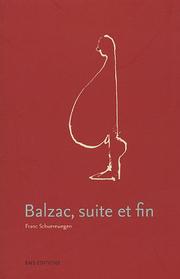
ISBN: 2847880534 9791036204562 Year: 2004 Volume: *7 Publisher: Lyon ENS
Abstract | Keywords | Export | Availability | Bookmark
 Loading...
Loading...Choose an application
- Reference Manager
- EndNote
- RefWorks (Direct export to RefWorks)
Ce livre raconte la crise d’identité d’un balzacien vieillissant. Il y est question entre autres de l’avenir des études balzaciennes et d’un type de lecture que l’auteur appelle apotropique (de apos, « loin de » et trope, « tour »). Entendons par là que le lecteur, surtout s’il est lecteur professionnel, doit faire attention à ne pas devenir l’esclave de son objet. La lecture est un acte de liberté. S’il cesse d’être libre, le lecteur étouffe. Balzac est mort d’avoir écrit La Comédie humaine ; son œuvre l’a tellement obsédé qu’elle a aussi fini par le tuer. Essayons de ne pas devenir comme lui. L’apotropie peut nous protéger contre ce risque de surinvestissement et d’enfermement monomane. Bonheur du critique institutionnel après avoir jeté son froc aux orties : le monde est soudainement devenu plus ouvert ; il reste des choses à dire sur Balzac, précisément parce qu’on a eu envie d’en finir avec Balzac. L’apotropie est une stratégie délibérément paradoxale.
Balzac, de, Honoré --- Balzac, Honoré de --- Criticism and interpretation --- Balzac, Honoré de, --- Ba'erzhake, --- Balzac, H. de --- Balzac, Honorato, --- Balzak, --- Balʹzak, Onore, --- Balzaḳ, Onoreh deh, --- Balzāk, Ūnūrīh dī, --- Banzăc, Hônôrê đơ, --- Baruzakku, --- de Balzac, Honorato, --- Jeune célibataire, --- Pa-erh-cha-kʻo, --- Бальзак, Оноре де, --- באלזאק, אנארע דע, --- באלזאק, אונורה דה, --- באלזאק, האָנאָרע דע, --- בלזק, אונורה דה, --- בלזק, הונורה דה-, --- דע־באלזאק, האָנאָרע, --- بالزاك، انوره دو --- バルザック, --- 巴爾札克, --- 巴爾扎克, --- R'Hoone, --- Saint-Aubin, Horace de, --- Cloteaux, Aurore --- Criticism and interpretation. --- Literature (General) --- Balzac, Honoré de --- critique et interprétation --- roman de langue française
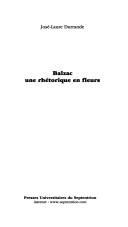
ISBN: 2859399712 9782859399719 2757427016 Year: 2006 Volume: *19 Publisher: Villeneuve-d'Ascq : Presses universitaires du Septentrion,
Abstract | Keywords | Export | Availability | Bookmark
 Loading...
Loading...Choose an application
- Reference Manager
- EndNote
- RefWorks (Direct export to RefWorks)
Tout serait tellement plus simple si Balzac pouvait être enfermé dans des territoires fussent-ils variés, dans des définitions fussent-elles contradictoires. Il ne serait pas nécessaire alors de le chercher dans son maillon qui paraît le plus faible, celui qui entraîne les considérations les plus affligées, jadis et aujourd’hui encore, son style ou plutôt ses styles. Si l’on accepte le temps d’un doute et la durée d’une observation, si l’on approche au plus près le lieu où les rhétoriques se figent et se brisent qui est aussi le lieu même de leur absence, on découvrira qu’est renvoyée dans la langue si étrange diffraction de couleurs qu’il semble qu’elles aient traversé les parcelles d’un merveilleux vitrail. Pluralité, éclatements, éclaboussements. Une grenade soudain dans la littérature. Ou bien un bouquet, un de ceux si magnifiques et improbables que composait Félix de Vandenesse qui se confond avec ceux de Balzac en l’infinité de ses incarnations, en même temps manifeste de son art poétique.
Balzac, Honoré de, --- Technique --- Balzac, Honoré de, - 1799-1850 - Technique --- Style. --- Criticism and interpretation. --- Literature (General) --- style --- rhétorique --- littérature --- Ba'erzhake, --- Balzac, H. de --- Balzac, Honorato, --- Balzak, --- Balʹzak, Onore, --- Balzaḳ, Onoreh deh, --- Balzāk, Ūnūrīh dī, --- Banzăc, Hônôrê đơ, --- Baruzakku, --- de Balzac, Honorato, --- Jeune célibataire, --- Pa-erh-cha-kʻo, --- Бальзак, Оноре де, --- באלזאק, אנארע דע, --- באלזאק, אונורה דה, --- באלזאק, האָנאָרע דע, --- בלזק, אונורה דה, --- בלזק, הונורה דה-, --- דע־באלזאק, האָנאָרע, --- بالزاك، انوره دو --- バルザック, --- 巴爾札克, --- 巴爾扎克, --- R'Hoone, --- Saint-Aubin, Horace de, --- Cloteaux, Aurore --- Balzac, Honoré de, - 1799-1850
Book
ISBN: 3736413483 Year: 2016 Publisher: [Dinslaken] : [Anboco],
Abstract | Keywords | Export | Availability | Bookmark
 Loading...
Loading...Choose an application
- Reference Manager
- EndNote
- RefWorks (Direct export to RefWorks)
Balzac, Honoré de, --- de Balzac, Honoré --- de Balzac, H. --- Balzac, Honoré de --- Ba'erzhake, --- Balzac, H. de --- Balzac, Honorato, --- Balzak, --- Balʹzak, Onore, --- Balzaḳ, Onoreh deh, --- Balzāk, Ūnūrīh dī, --- Banzăc, Hônôrê đơ, --- Baruzakku, --- de Balzac, Honorato, --- Jeune célibataire, --- Pa-erh-cha-kʻo, --- Бальзак, Оноре де, --- באלזאק, אנארע דע, --- באלזאק, אונורה דה, --- באלזאק, האָנאָרע דע, --- בלזק, אונורה דה, --- בלזק, הונורה דה-, --- דע־באלזאק, האָנאָרע, --- بالزاك، انوره دو --- バルザック, --- 巴爾札克, --- 巴爾扎克, --- R'Hoone, --- Saint-Aubin, Horace de, --- Cloteaux, Aurore
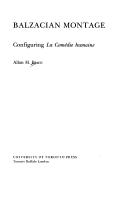
ISBN: 1282011618 9786612011610 1442671165 9781442671164 0802027768 9780802027764 9781282011618 Year: 1991 Publisher: Toronto
Abstract | Keywords | Export | Availability | Bookmark
 Loading...
Loading...Choose an application
- Reference Manager
- EndNote
- RefWorks (Direct export to RefWorks)
Balzac's monumental work, La Comédie humaine, consists of a wide range of novels, stories, and other writings which, he maintained, were to be read and understood as a whole. In this illuminating study Allen H. Pasco explores the work's unifying elements which lend weight to Balzac's claim.Pasco articulates the principles against which he measures the unity of La Comédie humaine: the relation of narrative to description; the relation of description to images and concept; how images are linked to each other and to the whole; the esthetic vision and unchronological arrangement of the work; the relationship between implicit frame and explicit context, and college vs montage. Pasco offers insightful readers of one or more novels as he considers each principle.He concludes that Balzac is the master not of collage - the construction of a whole from isolated pieces - but of montage: he regularly constructs wholes from other wholes.
LITERARY CRITICISM / General. --- Balzac, Honoré de, --- de Balzac, Honoré --- de Balzac, H. --- Balzac, Honoré de --- Ba'erzhake, --- Balzac, H. de --- Balzac, Honorato, --- Balzak, --- Balʹzak, Onore, --- Balzaḳ, Onoreh deh, --- Balzāk, Ūnūrīh dī, --- Banzăc, Hônôrê đơ, --- Baruzakku, --- de Balzac, Honorato, --- Jeune célibataire, --- Pa-erh-cha-kʻo, --- Бальзак, Оноре де, --- באלזאק, אנארע דע, --- באלזאק, אונורה דה, --- באלזאק, האָנאָרע דע, --- בלזק, אונורה דה, --- בלזק, הונורה דה-, --- דע־באלזאק, האָנאָרע, --- بالزاك، انوره دو --- バルザック, --- 巴爾札克, --- 巴爾扎克, --- R'Hoone, --- Saint-Aubin, Horace de, --- Cloteaux, Aurore
Book
ISBN: 9789004217928 9789004310162 9004310169 9004217924 Year: 2016 Publisher: Leiden Brill
Abstract | Keywords | Export | Availability | Bookmark
 Loading...
Loading...Choose an application
- Reference Manager
- EndNote
- RefWorks (Direct export to RefWorks)
Balzac et consorts. Scénographies familiales des conflits historiques dans le roman du XIXe siècle présente un ensemble d’études qui mettent en évidence la façon dont le microcosme de la famille tel que le roman du XIXe siècle le met en scène reflète les principaux conflits historiques de l’époque. Sous l’égide de Balzac, chez qui le roman fictionnalise exemplairement le rapport à l’Histoire, ces romans ne sont pas abordés comme une source documentaire mais bien comme le lieu d’une Histoire en actes dont les ondes de choc se propagent jusqu’au coeur de l’intime. Dans ce contexte, la notion de « scénographie » est centrale : elle désigne à la fois un dispositif narratif et une théâtralisation de ces conflits. Contributions de : Fabienne Bercegol, Claudie Bernard, Céline Bricault, Suzel Esquier, Isabelle Hervouet-Farrar, François Kerlouégan, Mireille Labouret, Alex Lascar, Roland Le Huenen, Jean-Philippe Luis, Maria Makropoulou, Marion Mas, Thierry Poyet, Éléonore Reverzy, Anne Rouhette, Claude Schopp, Jean-Christophe Valtat. Balzac et consorts. Scénographies familiales des conflits historiques dans le roman du XIXe siècle highlights the way in which family networks as depicted in the novels throughout the 19th century mirror the main historical conflicts of that period. As in Balzac’s novels, whose fiction exemplarily translates the effects of historical events on the individuals, these narratives are not considered as a collection of documents but rather as a special way of staging History and its main consequences onto the very heart of intimate relationships. In this context, the notion of “scenography” is essential: it points both to a narrative device and to a dramatization of these conflicts.
Fiction --- Thematology --- Comparative literature --- French literature --- anno 1800-1899 --- French fiction --- Families in literature --- English fiction --- Family in literature --- History and criticism. --- Criticism and interpretation. --- Balzac, Honoré de, --- de Balzac, Honoré --- de Balzac, H. --- Balzac, Honoré de --- Ba'erzhake, --- Balzac, H. de --- Balzac, Honorato, --- Balzak, --- Balʹzak, Onore, --- Balzaḳ, Onoreh deh, --- Balzāk, Ūnūrīh dī, --- Banzăc, Hônôrê đơ, --- Baruzakku, --- de Balzac, Honorato, --- Jeune célibataire, --- Pa-erh-cha-kʻo, --- Бальзак, Оноре де, --- באלזאק, אנארע דע, --- באלזאק, אונורה דה, --- באלזאק, האָנאָרע דע, --- בלזק, אונורה דה, --- בלזק, הונורה דה-, --- דע־באלזאק, האָנאָרע, --- بالزاك، انوره دو --- バルザック, --- 巴爾札克, --- 巴爾扎克, --- R'Hoone, --- Saint-Aubin, Horace de, --- Cloteaux, Aurore
Book
ISBN: 069106282X 1322883580 0691617473 1400869692 9781400869695 9780691617473 9780691062822 Year: 1975 Publisher: Princeton Princeton University Press
Abstract | Keywords | Export | Availability | Bookmark
 Loading...
Loading...Choose an application
- Reference Manager
- EndNote
- RefWorks (Direct export to RefWorks)
Although Balzac's work has been much studied, practically nothing has been written on his use of linguistic concepts. Applying a new approach, this perceptive book demonstrates that the theme and theory of language were central to Balzac's fiction. In considering how the novelist was influenced by eighteenth- and nineteenth-century speculation on language, Martin Kanes traces the development of Balzac's own linguistic ideas from his early to his later writings.Originally published in 1976.The Princeton Legacy Library uses the latest print-on-demand technology to again make available previously out-of-print books from the distinguished backlist of Princeton University Press. These editions preserve the original texts of these important books while presenting them in durable paperback and hardcover editions. The goal of the Princeton Legacy Library is to vastly increase access to the rich scholarly heritage found in the thousands of books published by Princeton University Press since its founding in 1905.
Balzac, de, Honoré --- Balzac, Honore de --- Language --- -Language --- Balzac, Honoré de, 1799-1850 -- Language. --- Romance Literatures --- Languages & Literatures --- French Literature --- Balzac, Honoré de, --- Language. --- Balzac, Honore de, --- de Balzac, Honoré --- de Balzac, H. --- Balzac, Honoré de --- LITERARY CRITICISM / European / French. --- Ba'erzhake, --- Balzac, H. de --- Balzac, Honorato, --- Balzak, --- Balʹzak, Onore, --- Balzaḳ, Onoreh deh, --- Balzāk, Ūnūrīh dī, --- Banzăc, Hônôrê đơ, --- Baruzakku, --- de Balzac, Honorato, --- Jeune célibataire, --- Pa-erh-cha-kʻo, --- Бальзак, Оноре де, --- באלזאק, אנארע דע, --- באלזאק, אונורה דה, --- באלזאק, האָנאָרע דע, --- בלזק, אונורה דה, --- בלזק, הונורה דה-, --- דע־באלזאק, האָנאָרע, --- بالزاك، انوره دو --- バルザック, --- 巴爾札克, --- 巴爾扎克, --- R'Hoone, --- Saint-Aubin, Horace de, --- Cloteaux, Aurore --- Balzac, Honore de - Language
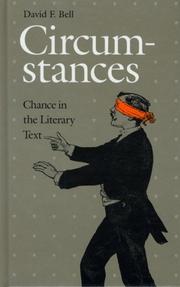
ISBN: 058500367X 9780585003672 0803212291 Year: 1993 Publisher: Lincoln University of Nebraska Press
Abstract | Keywords | Export | Availability | Bookmark
 Loading...
Loading...Choose an application
- Reference Manager
- EndNote
- RefWorks (Direct export to RefWorks)
French fiction --- Realism in literature. --- Chance in literature. --- Realism in literature --- Chance in literature --- Romance Literatures --- Languages & Literatures --- French Literature --- Neorealism (Literature) --- Magic realism (Literature) --- Mimesis in literature --- History and criticism. --- History and criticism --- Balzac, Honoré de, --- Stendhal, --- Stendhal --- M. B. A. A. --- Beyle, Marie-Henri --- de Balzac, Honoré --- de Balzac, H. --- Balzac, Honoré de --- Criticism and interpretation. --- Balzac, Honoré de, --- Ba'erzhake, --- Balzac, H. de --- Balzac, Honorato, --- Balzak, --- Balʹzak, Onore, --- Balzaḳ, Onoreh deh, --- Balzāk, Ūnūrīh dī, --- Banzăc, Hônôrê đơ, --- Baruzakku, --- de Balzac, Honorato, --- Jeune célibataire, --- Pa-erh-cha-kʻo, --- Бальзак, Оноре де, --- באלזאק, אנארע דע, --- באלזאק, אונורה דה, --- באלזאק, האָנאָרע דע, --- בלזק, אונורה דה, --- בלזק, הונורה דה-, --- דע־באלזאק, האָנאָרע, --- بالزاك، انوره دو --- バルザック, --- 巴爾札克, --- 巴爾扎克, --- R'Hoone, --- Saint-Aubin, Horace de, --- Cloteaux, Aurore --- スタンダール

ISBN: 0585042934 9780585042930 0791430235 0791430243 1438405200 Year: 1996 Publisher: Albany State University of New York Press
Abstract | Keywords | Export | Availability | Bookmark
 Loading...
Loading...Choose an application
- Reference Manager
- EndNote
- RefWorks (Direct export to RefWorks)
Literature, Comparative --- Death in literature. --- Short story. --- Comparative literature --- Death in literature --- Short story --- Languages & Literatures --- Germanic Literature --- Short stories --- Story, Short --- Authorship --- Fiction --- Philology --- German and French. --- French and German. --- German and French --- French and German --- History and criticism --- Kleist, Heinrich von, --- Balzac, Honoré de, --- de Balzac, Honoré --- de Balzac, H. --- Balzac, Honoré de --- Kleĭst, Genrikh, --- Kleist, Bernd Heinrich Wilhelm von, --- Kleist, H. V. --- Ḳlaisṭ, Hainrikh fun, --- קלייסט, היינריך --- קלייסט, היינריך פון, --- קלייסט, הינריך פון, --- Criticism and interpretation. --- Balzac, Honoré de, --- Ba'erzhake, --- Balzac, H. de --- Balzac, Honorato, --- Balzak, --- Balʹzak, Onore, --- Balzaḳ, Onoreh deh, --- Balzāk, Ūnūrīh dī, --- Banzăc, Hônôrê đơ, --- Baruzakku, --- de Balzac, Honorato, --- Jeune célibataire, --- Pa-erh-cha-kʻo, --- Бальзак, Оноре де, --- באלזאק, אנארע דע, --- באלזאק, אונורה דה, --- באלזאק, האָנאָרע דע, --- בלזק, אונורה דה, --- בלזק, הונורה דה-, --- דע־באלזאק, האָנאָרע, --- بالزاك، انوره دو --- バルザック, --- 巴爾札克, --- 巴爾扎克, --- R'Hoone, --- Saint-Aubin, Horace de, --- Cloteaux, Aurore --- von Kleist, Heinrich
Book
ISBN: 1786944154 1942954247 1942954239 9781942954248 9781942954231 Year: 2016 Publisher: Clemson, South Carolina
Abstract | Keywords | Export | Availability | Bookmark
 Loading...
Loading...Choose an application
- Reference Manager
- EndNote
- RefWorks (Direct export to RefWorks)
The romances of Herman Melville, author of Moby-Dick and Billy Budd, Sailor, are usually examined from some setting almost exclusively American. European or other planetary contexts are subordinated to local considerations. But while this isolated approach plays well in an arena constructed on American exclusiveness, it does not express the reality of the literary processes swirling around Melville in the middle of the nineteenth century. A series of expanding literary and technological networks was active that made his writing part of a global complex. Honoré de Balzac, popular French writer and creator of realism in the novel, was also in the web of these same networks, both preceding and at the height of Melville's creativity. Because they engaged in similar intentions, there developed an almost inevitable attraction that brought their works together. Until recently, however, Balzac has not been recognized as a significant influence on Melville during his most creative period. Over the last decade, scholars began to explore literary networks by new methodologies, and the criticism developed out of these strategies pertains usually to modernist, postcolonial, contemporary situations. Remarkably, however, the intertextuality of Melville with Balzac is quite exactly a casebook study in transcultural comparativism. Looking at Melville's innovative environment reveals meaningful results where the networks take on significant roles equivalent to what have been traditionally classed as genetic contacts. Intervisionary Network explores a range of these connections and reveals that Melville was dependent on Balzac and his universal vision in much of his prose writing.
Realism in literature. --- American literature --- Neorealism (Literature) --- Magic realism (Literature) --- Mimesis in literature --- History and criticism. --- Melville, Herman, --- Melville, Herman --- Melvill, German --- Melville, Hermann --- Meville, Herman --- Melvil, Cherman --- Mai-erh-wei-erh, Ho-erh-man --- Melṿil, Herman --- Tarnmoor, Salvator R. --- מלוויל, הרמן, --- מלויל, הרמן, --- ميلڤيل، هرمن، --- 麥爾維爾, --- Virginian spending July in Vermont, --- Melvill, Herman, --- Criticism and interpretation. --- Balzac, Honoré de, --- Influence. --- Ba'erzhake, --- Balzac, H. de --- Balzac, Honorato, --- Balzak, --- Balʹzak, Onore, --- Balzaḳ, Onoreh deh, --- Balzāk, Ūnūrīh dī, --- Banzăc, Hônôrê đơ, --- Baruzakku, --- de Balzac, Honorato, --- Jeune célibataire, --- Pa-erh-cha-kʻo, --- Бальзак, Оноре де, --- באלזאק, אנארע דע, --- באלזאק, אונורה דה, --- באלזאק, האָנאָרע דע, --- בלזק, אונורה דה, --- בלזק, הונורה דה-, --- דע־באלזאק, האָנאָרע, --- بالزاك، انوره دو --- バルザック, --- 巴爾札克, --- 巴爾扎克, --- R'Hoone, --- Saint-Aubin, Horace de, --- Cloteaux, Aurore --- literary influence American --- Balzac --- intertextuality American --- American Renaissance writers --- Melville
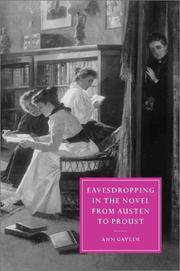
ISBN: 1107126002 1280159723 0511120761 0511042604 0511157916 0511329865 0511484801 0511045824 9780511042607 9780511120763 9780511045820 9780511484803 9780521815857 0521815851 9780521038904 0521038901 Year: 2002 Publisher: Cambridge, U.K. New York Cambridge University Press
Abstract | Keywords | Export | Availability | Bookmark
 Loading...
Loading...Choose an application
- Reference Manager
- EndNote
- RefWorks (Direct export to RefWorks)
Eavesdropping in the Novel from Austen to Proust investigates human curiosity and its representation in eavesdropping scenes in nineteenth-century English and French novels. Ann Gaylin argues that eavesdropping dramatizes a primal human urge to know and offers a paradigm of narrative transmission and reception of information among characters, narrators and readers. Gaylin sheds light on the social and psychological effects of the nineteenth-century rise of information technology and accelerated flow of information, as manifested in the anxieties about - and delight in - displays of private life and its secrets. Analysing eavesdropping in Austen, Balzac, Collins, Dickens and Proust, Gaylin demonstrates the flexibility of the scene to produce narrative complication or resolution; to foreground questions of gender and narrative agency; to place the debates of privacy and publicity within the literal and metaphoric spaces of the nineteenth-century novel. This 2003 study will be of interest to scholars of nineteenth-century English and European literature.
English fiction --- Eavesdropping in literature. --- Comparative literature --- French fiction --- History and criticism. --- English and French. --- French and English. --- Austen, Jane, --- Collins, Wilkie, --- Balzac, Honoré de, --- Proust, Marcel, --- de Balzac, Honoré --- de Balzac, H. --- Balzac, Honoré de --- Collins, William Wilkie, --- Collins, William Wilkie --- Kollinz, Uilki, --- Collins, W., --- Collins, W. Wilkie, --- Коллинз, Уилки, --- קולינס, וילקי, --- 柯林斯威尔基, --- Ao-ssu-ting, --- Ao-ssu-ting, Chien, --- Aosiding, --- Aosiding, Jian, --- Āsṭin̲, Jēn̲, --- Austenová, Jane, --- Osten, Dzheĭn, --- Ostin, Dzhein, --- Lady, --- Author of Sense and Sensibility, --- Остен, Джейн, --- Остен, Джейм, --- אוסטן, ג׳יין --- אוסטן, ג׳יין, --- أوستن، جين، --- Views on eavesdropping. --- Prust, Marselʹ, --- Proust, Valentin Louis Georges Eugène Marcel, --- Pʻŭrusŭtʻŭ, Marŭsel, --- Pʻu-lu-ssu-tʻe, --- Пруст, Марсель, --- פרוסט, מארסל --- פרוסט, מרסל --- ,פרוסט, מרסל --- بروست، مارسيل،, --- Criticism and interpretation. --- Ba'erzhake, --- Balzac, H. de --- Balzac, Honorato, --- Balzak, --- Balʹzak, Onore, --- Balzaḳ, Onoreh deh, --- Balzāk, Ūnūrīh dī, --- Banzăc, Hônôrê đơ, --- Baruzakku, --- de Balzac, Honorato, --- Jeune célibataire, --- Pa-erh-cha-kʻo, --- Бальзак, Оноре де, --- באלזאק, אנארע דע, --- באלזאק, אונורה דה, --- באלזאק, האָנאָרע דע, --- בלזק, אונורה דה, --- בלזק, הונורה דה-, --- דע־באלזאק, האָנאָרע, --- بالزاك، انوره دو --- バルザック, --- 巴爾札克, --- 巴爾扎克, --- R'Hoone, --- Saint-Aubin, Horace de, --- Cloteaux, Aurore --- Arts and Humanities --- Literature --- Proust, Marcel --- Balzac, Honore de,
| Listing 1 - 10 of 14 | << page >> |
Sort by
|

 Search
Search Feedback
Feedback About UniCat
About UniCat  Help
Help News
News